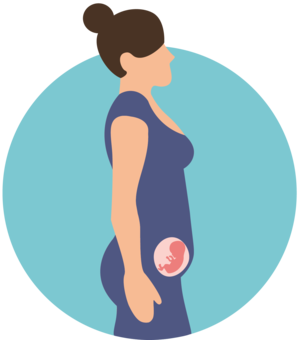Pregnancy at week 19
4-minute read
Your baby
Your baby’s rapid growth is continuing. They now weigh about 260g and measure about 15cm - the length of a small banana. A layer of fat is developing underneath the skin and their head may be covered with hair.
At 19 weeks, your baby has clear waking and sleep cycles, like a newborn baby. They will sleep for about 18 hours a day and move around for about 6 hours a day.
They can react to sounds that come from outside your tummy, so you can read or play music to them – things they will recognise after they’re born.
Your baby at 19 weeks
| Length: | 15cm |
| Weight: | 260g |

Your body
Most women look obviously pregnant by 19 weeks. Baby 'bumps' come in all shapes and sizes, however, so don’t worry if yours looks bigger or smaller than other women at the same stage of pregnancy. Your doctor or midwife will feel and measure your tummy at your regular antenatal visits to make sure the baby is growing as it should.
Not only will your abdomen be large and round, you may find your feet grow too. This is because your ligaments are stretching and you are carrying extra weight. Your breasts will be larger and you will be curvier overall.
Things to remember
Some women find their changing shape affects how they feel about themselves and their relationships. Open communication is the key to negotiating any fears, stress or changes to your sex life that pregnancy might bring.
Some women develop anxiety or depression during their pregnancy. You are more at risk if you have had a mental health problem in the past. Symptoms might include:
- having a panic attack
- worrying all the time
- having mood swings
- feeling sad and low all the time
- feeling nervous and 'on edge'
- losing interest in your friends and family
- feeling constantly exhausted
- having thoughts of hurting yourself
- sleeping too much or not at all
If you feel like this for more than 2 weeks while you’re pregnant, it’s important to tell your doctor. Prenatal depression and anxiety are common and they are treatable.
For more information and help on prenatal depression and anxiety, visit the Perinatal Anxiety & Depression Australia (PANDA) website, or call the PANDA hotline on 1300 726 306.
Read next

Your pregnancy at 20 weeks
Learn about your pregnancy journey and what is happening to you and your baby.

Speak to a maternal child health nurse
Call Pregnancy, Birth and Baby to speak to a maternal child health nurse on 1800 882 436 or video call. Available 7am to midnight (AET), 7 days a week.
Learn more here about the development and quality assurance of healthdirect content.
Last reviewed: April 2022



